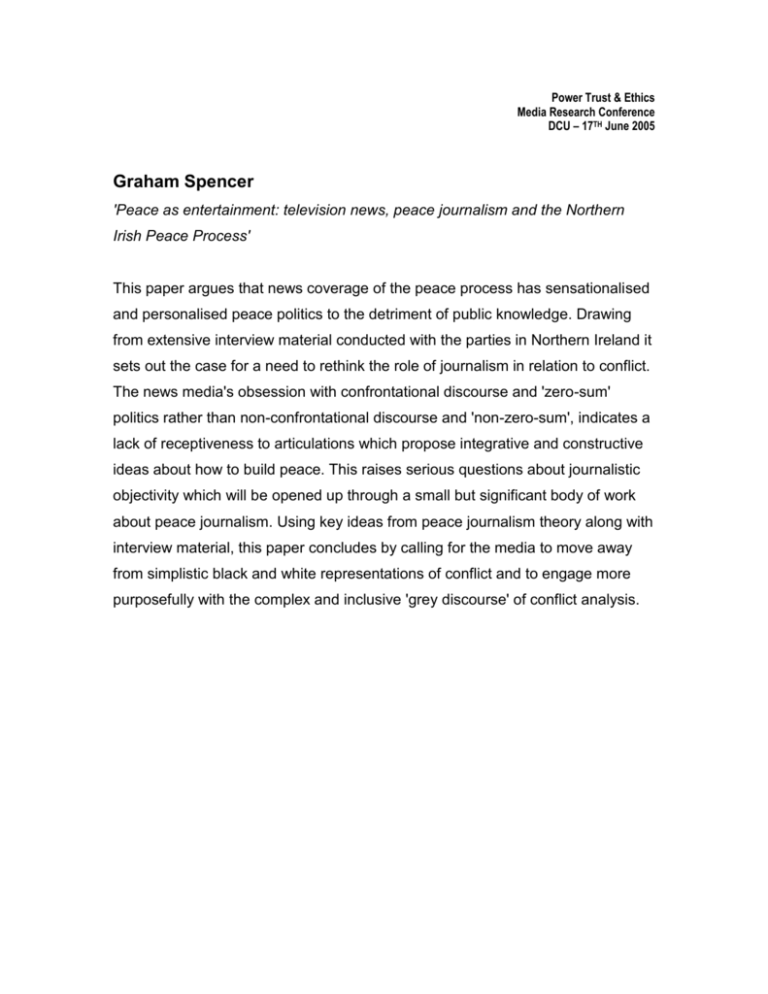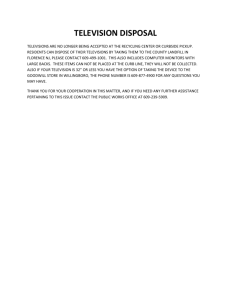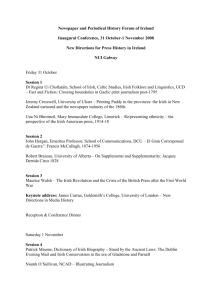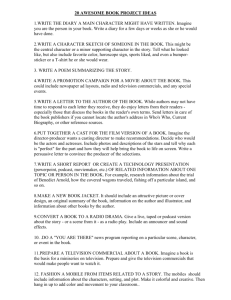
Power Trust & Ethics
Media Research Conference
DCU – 17TH June 2005
Graham Spencer
'Peace as entertainment: television news, peace journalism and the Northern
Irish Peace Process'
This paper argues that news coverage of the peace process has sensationalised
and personalised peace politics to the detriment of public knowledge. Drawing
from extensive interview material conducted with the parties in Northern Ireland it
sets out the case for a need to rethink the role of journalism in relation to conflict.
The news media's obsession with confrontational discourse and 'zero-sum'
politics rather than non-confrontational discourse and 'non-zero-sum', indicates a
lack of receptiveness to articulations which propose integrative and constructive
ideas about how to build peace. This raises serious questions about journalistic
objectivity which will be opened up through a small but significant body of work
about peace journalism. Using key ideas from peace journalism theory along with
interview material, this paper concludes by calling for the media to move away
from simplistic black and white representations of conflict and to engage more
purposefully with the complex and inclusive 'grey discourse' of conflict analysis.
Power Trust & Ethics
Media Research Conference
DCU – 17TH June 2005
Brian Torode
Bargaining games and language games in media representation of news events
Rational Choice theory (Laver 1997) analyses party competition for votes in
elections and post-election coalition formation as win/lose strategic “games”.
Such high-profile events are relatively rare big games in the “real world”. But the
news media maintain consumer interest during the low-profile periods between,
by presenting news stories, interviews, panel discussions, and audience
participation shows as little games in their own right (Gamson 1984).
Rational Choice analysis of political “big game playing” is insightful but
reductionist. It upholds hegemony of professional politics, journalism, and
academic analysis, over mundane everyday life (Patterson 1993). Media
coverage of “little games” reveals a multiplicity of issues which are handled in a
playful, even profligate matter. Wittgenstein’s (1953) concept of language games
provides a way to reveal this richer context.
This paper will focus on Irish, British and Northern Irish television panel
discussions (Clayman and Heritage 2002) in which professional politicians,
participating alongside other panellists before a lay audience, are called to
account by appeal to ordinary everyday experience. A particular focus of
attention will be what Martin McGuinness (27 March 2005), has called “the ‘What
is a crime?’ game” played by journalists with Sinn Fein.
Power Trust & Ethics
Media Research Conference
DCU – 17TH June 2005
Gregory McLaughlin and Stephen Baker
‘Ordinary people’, politics and the media in Northern Ireland
The ways by which so-called ‘ordinary people’ get access to the media is not
very well understood. Media studies tend to confine their interest in ‘ordinary
people’ to what they do as an audience. Less attention has been given to the
notion that they might also engage in the production and distribution of political
messages, often to counter the preferred meanings of mainstream media.
Political conflict is not only experienced directly by individuals and groups, its
subsequent representation in news, and indeed dramatic and cinematic forms,
also become part of that experience.
This paper considers how the media construct the category of ‘ordinary people’.
It looks beyond this empty category to the ways in which the public engage in the
political process and political communication. The authors are concerned that the
designation ‘ordinary people’ has provided a means by which to depoliticise,
circumscribe or even discount altogether the political experience of certain
sections of the public.
In Northern Ireland, the representation of ‘ordinary people’ has taken on quite
specific characteristics in the period of the peace process. They are configured
as passive, domestic citizens or victims of criminal and political violence; they
can be the subjects of soft news features or folksy memoirs but never permitted
political convictions and motivations.
Dissent is discouraged, protestors and demonstrators are rendered deviant, and
political disputes between social groups are represented as the apparent “failure
of politics”. This strategy may appear to have the virtue of isolating sectarian
rhetoric and behaviour but it also emasculates the public sphere and political
discourse.
Power Trust & Ethics
Media Research Conference
DCU – 17TH June 2005
Eoin Devereux, Amanda Haynes & Michael Breen
Public Exercises in Othering: Irish Print Media Coverage of Asylum Seekers
and Refugees
Recent public attitudes research indicates that Ireland has witnessed both an
increase in levels of intolerance generally and in racism in particular. Using a
frame analysis approach this paper examines how the Irish print media have
responded to the new phenomenon of inward migration in Irish society.
Drawing upon a sample of broadsheet and tabloid newspaper articles from 2002
we detail and discuss the significance of eight key frames (five negative and
three positive) which, we argue, are prevalent within media content. Furthermore,
we argue that the predominantly negative media coverage plays a crucial role in
the generation of fear in Irish society about new migrants.
We hold that we are witnessing, within media coverage, a public exercise in
othering. In this paper we seek to identify and elaborate the frames that are
embedded in newspaper texts in Ireland in the context of refugees and asylum
seekers. Fear plays a significant and dominant role in much of the media
construction of refugees and asylum seekers.
Our emerging theorisation interprets the negative frames identified as a
reproduction of historical othering discourses, leading to the construction of
asylum seekers and refugees as a threat.
Power Trust & Ethics
Media Research Conference
DCU – 17TH June 2005
Hugh Gash and Barbara Bajd
Young people’s heroes in Ireland and Slovenia
Digital culture is becoming increasingly global and accessible. It is important to
see how participation in the EU global economic culture has changed young
people’s self images.
Representations of heroic figures in questionnaires given to Irish and Slovenian
samples of 15-year-olds were examined to assess whether heroes originated in
film and television, and whether the heroic figures were local or global
personalities.
The degree to which age and gender influenced choice of hero was examined
within the Irish sample, which included 10-year-olds. There is strong evidence
that heroes in this sample are largely global figures learned about on video and
television.
Children choose heroes more often than heroines, though a child’s sex is
associated with the sex of the chosen hero. Family sport and musical heroes
were more important in Ireland and audio-visual heroes in Slovenia. In the posttelevision era, the sequence for acquisition of hero types reported in the pretelevision era – proximal (family and community) before distal (beyond the
neighbourhood) - seems to have disappeared.
Power Trust & Ethics
Media Research Conference
DCU – 17TH June 2005
Carol MacKeogh
Teenagers and the Media: a Media Analysis of Sexual Content on Television
There is an extensive tradition of research investigating the role that the media
play for young people in the development of their sexuality. Along with violence,
sexual content has been at the forefront of concerns as to the power of the media
in influencing young people. The extent of this ‘influence’ has been keenly
contested from more extreme claims of copy-cat behaviour to milder forms of
sexual language acquisition. In particular, television is often cited as a key
source of knowledge about sexual matters. While other media, such as
magazines, play an important role, television places sexual behaviour and talk in
a more co-receptive, public forum, and in doing so, may be seen to provide a
form of legitimation.
A first step in exploring the complex relationship between sexual content and
potential effects entails establishing the levels and forms of sexuality that are
portrayed on television. What kind of sexual messages are depicted and how
extensive are they? In this context, a number of research methodologies have
been developed to establish quantitative measures of sexual content, along with
measures of representation such as explicitness and programme context. A
second step entails questioning reception of such messages: How do young
people ‘read’ the messages on television? How might they relate them to their
lives? How vulnerable are they in the face of such messages about sexuality?
This paper is based on a project that was funded by the Crisis Pregnancy
Agency, including a content analysis of the Irish television landscape and a
series of qualitative interviews with teenager viewers.
Power Trust & Ethics
Media Research Conference
DCU – 17TH June 2005
Ann-Marie Murray
An analysis of Irish television schedules in their social context
This paper presents an analysis of the Irish television schedules across a 15year time-frame, from 1990 to present day. Dramatic developments in the media
industry, including the spread of the market economy into the broadcasting
sector and deregulation, have combined to create a television system that is now
primarily driven by commercial interests. Broadcasters have been obliged to
adopt new strategies to survive and compete in this new environment.
Scheduling is central to this strategy and is now the organising principle of
television production; this hitherto overlooked and poorly understood aspect of
television is the focus of the study. The analysis tracks changes in the
programme output and identifies trends in scheduling practices. The schedule
analysis forms the basis of a study which considers the television schedule as a
socially embedded phenomenon. The study examines how the social, political
and economic contexts of Irish broadcasting influence the programme output of
Irish television channels.
Power Trust & Ethics
Media Research Conference
DCU – 17TH June 2005
Bill Sweeney
RTÉ: Public Service Broadcaster? - The View From Inside
My current research into Irish broadcasting examines RTÉ. The theme is that,
while RTÉ seeks to broadcast within the public service broadcasting (PSB)
tradition, an analysis of interviews carried out to determine the views of key RTÉ
staff shows that this intention is limited and distorted when considered in the
context of RTÉ's schedules and programme content. Over a hundred interviews
were carried out, half during visits each January 2000-2004, half as a snapshot
of current practice during Summer 2004. Interviewees were from both broadcast
policy-making and broadcast production/presentation backgrounds. The focus of
this paper is to critique the views expressed by RTÉ staff during Summer 2004
and to argue that many of the limitations and distortions to RTÉ's stated PSB
intentions occur due to external influences, specifically the politically controlled
licence fee funding mechanism and the need for RTÉ to compete directly with
other broadcasters for commercial revenue.
Power Trust & Ethics
Media Research Conference
DCU – 17TH June 2005
Robert Savage
Edward Roth as Director General of RTÉ
At the first meeting of the Television Authority (June 1960) the government
minster responsible for overseeing the new service, Michael Hilliard, delivered a
sharply worded address, much of which had been written, reviewed, and edited
by the Taoiseach, Sean Lemass. Hilliard made it clear that there were important
matters that he wanted to share privately or ‘off the record’ with the new
Authority. The Minister declared that the Government wanted the new service to
become financially stable as quickly as possible, relating the achievement of this
goal to the degree of independence television would enjoy.
A short time later (July 1960), Eamonn Andrews and the new Television Authority
met to discuss filling the key position in Telefis Eireann, that of Director-General.
Just as things were beginning to look bleak, an application arrived from
Guadalajara, Mexico, that stood head and shoulders above the rest. This came
from from an American, Edward Roth, who was quickly invited to Dublin for an
interview. One can see why Roth’s application impressed an Authority under
considerable pressure to find a candidate not only with very specific technical
and managerial expertise but also one who understood the commercial
component of television broadcasting. As an Irish-American Catholic, Roth had
the ethnic and religious background providing a certain level of comfort and cover
for the Television Authority. Roth was born in Boston, Massachusetts, and both
his maternal and paternal grandparents had emigrated from Ireland at the turn of
the last century. Roth was interviewed by the Television Authority in August 1960
and made a remarkable impression. The Chairman of the Authority, Eamonn
Andrews, wrote a report for the Government explaining that the members were
“unanimous in their opinion” that Roth should be hired. The paper considers
Edward Roth’s brief tenure as Director-General.









